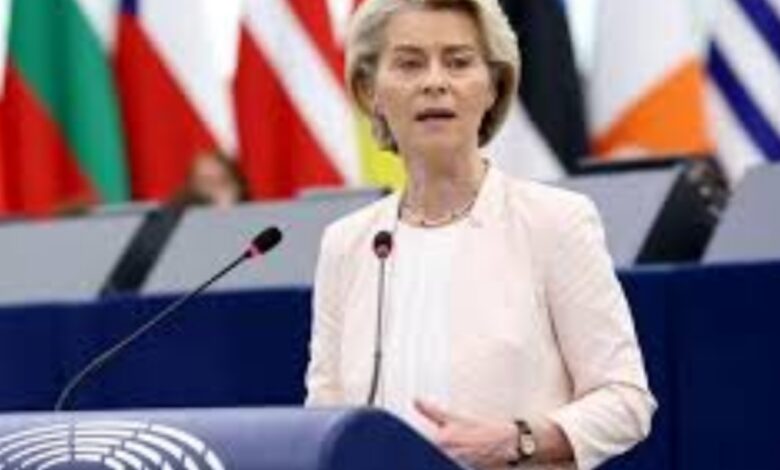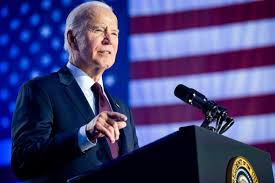EU’s von der Leyen Vows Security Focus Before Vote on Top Job

Introduction
As the European Union prepares for a critical vote on its top executive position, Ursula von der Leyen, the incumbent President of the European Commission, has pledged to prioritize security in her agenda. This focus comes at a time of heightened geopolitical tensions, technological advancements, and internal challenges within the EU. Von der Leyen’s commitment to security underscores the EU’s recognition of the evolving threats and the necessity for a robust and coordinated response.
Ursula von der Leyen’s Background
Ursula von der Leyen, a seasoned politician from Germany, has served as the President of the European Commission since December 2019. Before her current role, she held various ministerial positions in the German government, including Minister of Defence, where she gained substantial experience in security and defence matters. Her tenure at the European Commission has been marked by efforts to strengthen the EU’s strategic autonomy, address the COVID-19 pandemic, and promote the Green Deal.
Security Challenges Facing the EU
The EU faces a complex security landscape that requires comprehensive and coordinated strategies. Key challenges include:
- Geopolitical Tensions: The EU’s relationship with major powers such as Russia, China, and the United States is marked by both cooperation and contention. Issues like the conflict in Ukraine, cybersecurity threats from state actors, and trade disputes highlight the need for a cohesive EU foreign and security policy.
- Terrorism and Extremism: Despite significant counter-terrorism efforts, Europe continues to be vulnerable to terrorist attacks. The threat from both jihadist terrorism and far-right extremism requires ongoing vigilance and proactive measures.
- Cybersecurity: The increasing digitization of critical infrastructure and services exposes the EU to cyber-attacks. Ensuring the security of digital networks, protecting data, and building cyber resilience are essential for maintaining the integrity of the EU’s economies and societies.
- Migration and Border Security: Managing migration flows and ensuring the security of the EU’s external borders remain pressing issues. The challenge is to balance humanitarian responsibilities with the need to prevent illegal immigration and trafficking.
- Climate Change: Recognized as a security threat multiplier, climate change exacerbates existing vulnerabilities and can lead to resource conflicts, displacement, and increased pressure on infrastructure.
Von der Leyen’s Security Agenda
In response to these multifaceted challenges, Ursula von der Leyen has outlined a security-focused agenda aimed at enhancing the EU’s resilience and strategic capabilities. Key components of her agenda include:
- Strengthening Defence Cooperation: Von der Leyen advocates for deeper defence cooperation among EU member states. This includes increasing investments in defence, enhancing interoperability of armed forces, and developing joint capabilities. Initiatives such as the European Defence Fund and Permanent Structured Cooperation (PESCO) are central to this effort.
- Enhancing Cybersecurity: Addressing the growing threat of cyber-attacks, von der Leyen supports the establishment of a European Cybersecurity Shield. This initiative aims to improve coordination among member states, bolster cyber defences, and facilitate rapid response to cyber incidents. Investing in research and innovation to stay ahead of cyber threats is also a priority.
- Tackling Hybrid Threats: Recognizing the complexity of modern security threats, von der Leyen emphasizes the need to address hybrid threats that combine conventional and unconventional tactics. This includes countering disinformation, protecting critical infrastructure, and enhancing situational awareness through intelligence sharing and joint exercises.
- Border Security and Migration Management: Strengthening the EU’s external borders through the European Border and Coast Guard Agency (Frontex) is a key priority. Von der Leyen advocates for more resources and personnel for Frontex, as well as better coordination with non-EU countries to manage migration flows and combat human trafficking.
- Promoting Resilience: Building resilience against various threats, including climate-related risks, is central to von der Leyen’s security agenda. This involves integrating climate adaptation measures into security planning, enhancing disaster response capabilities, and promoting sustainable development.
- Boosting EU’s Strategic Autonomy: Von der Leyen stresses the importance of reducing the EU’s dependency on external actors in critical areas such as energy, technology, and pharmaceuticals. This includes diversifying supply chains, investing in homegrown innovation, and strengthening the EU’s industrial base.
Political and Institutional Implications
Von der Leyen’s security-focused agenda is likely to have significant political and institutional implications. Achieving her goals will require strong collaboration among EU member states, overcoming differing national priorities and perspectives on security matters. Building consensus on increasing defence spending and pooling resources for joint initiatives will be challenging but necessary for a unified approach.
Institutionally, von der Leyen’s agenda underscores the need for a more integrated and efficient decision-making process within the EU. Strengthening the role of the European Commission in coordinating security and defence policies, enhancing the capabilities of EU agencies such as Europol and Frontex, and fostering closer cooperation with NATO are key steps.
Conclusion
Ursula von der Leyen’s vow to focus on security ahead of the vote on the EU’s top job reflects a recognition of the evolving and multifaceted threats facing the Union. Her comprehensive agenda aims to bolster the EU’s defence capabilities, enhance cybersecurity, manage migration effectively, and build resilience against various risks. Achieving these objectives will require strong political will, institutional reforms, and robust cooperation among member states. As the EU navigates these complex security challenges, von der Leyen’s leadership and vision will be crucial in steering the Union towards greater stability and strategic autonomy.



